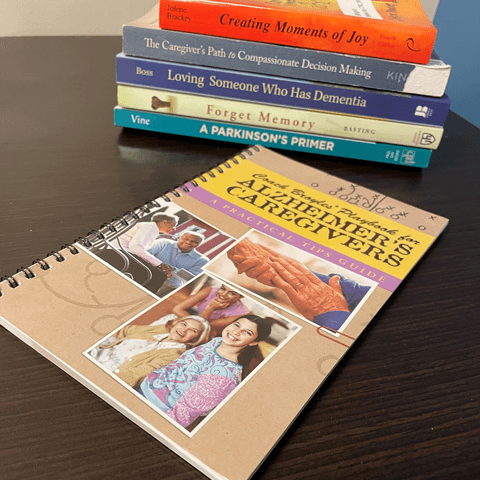
Summer Reading List
In the midst of summer, many of us reach for our favorite beach reads, looking forward to a few hours relaxing. However, as a caregiver for someone with memory impairment, those relaxing moments can be few and far between – and the few you have, that time is valuable! If you’re looking to make the most of your summer reading list, here are a few recommendations that we and other care partners have found helpful.
Loving Someone Who Has Dementia: How to Find Hope while Coping with Stress and Grief
This research-based advice for people who care for someone with dementia takes a focus on managing on-going stress and grief. Dr. Boss helps caregivers find hope in "ambiguous loss"—having a loved one both here and not here, physically present but psychologically absent. She outlines seven guidelines to stay resilient while caring for someone who has dementia, discusses the meaning of relationships with individuals who are cognitively impaired and no longer as they used to be, and offers approaches to understand and cope with the emotional strain of caregiving. She shows you a way to embrace rather than resist the ambiguity in your relationship with someone who has dementia!
(Amazon) (Bookshop)
Forget Memory: Creating Better Lives for People with Dementia
Memory loss can be one of the most terrifying aspects of a diagnosis of dementia. Yet the fear and dread of losing our memory make the experience of the disease worse than it needs to be, according to cultural critic and playwright Anne Davis Basting. She says, Forget memory. Basting emphasizes the importance of activities that focus on the present to improve the lives of persons with Alzheimer's disease and other dementias.
Based on ten years of practice and research in the field, Basting’s study includes specific examples of innovative programs that stimulate growth, humor, and emotional connection; translates into accessible language a wide range of provocative academic works on memory; and addresses how advances in medical research and clinical practice are already pushing radical changes in care for persons with dementia. Basting's cultural critique of dementia care offers a vision for how we can change the way we think about and care for people with memory loss.
(Amazon) (Bookshop)
The Caregiver's Path to Compassionate Decision Making: Making Choices for Those Who Can't
You know how difficult--even heartbreaking--it can be to make decisions for someone with memory impairment. Feeling confident that you've made the right decision would be a welcome relief from the worry and guilt you may be feeling. The Caregiver's Path is an invaluable resource for caregivers struggling to make the right decisions, whether it's taking away the car keys, moving to a long-term care facility or making the difficult medical and end-of-life choices.
Learn the framework and tools to create a good, ethical decision with specific strategies and questions to use along the decision making pathway. Respect and compassion are the core values of this decision making process. This is not a one-size-fits-all solution but can be adapted depending on the individual's level of incapacity and the situation. Throughout the book are personal and real-life stories to help illustrate these tools. At the end of the book, Viki gives expanded end-of-life guidance for making the most difficult decisions.
(Amazon) (Bookshop)
When Reasoning No Longer Works: A Practical Guide for Caregivers Dealing with Dementia & Alzheimer's Care
Nearly five million families deal with Alzheimer's Disease and other forms of dementia on a daily basis. They do this with little training, and often only their good intentions guide them. When Reasoning No Longer Works is the training manual these family caregivers have been searching for. Written by a Gerontologist with more than twenty years of experience, this reference gives the reader an easy to understand view of what dementia does to the brain, how it is diagnosed, and most importantly, how to deal with its effects. Topics include how to avoid a catastrophic reaction, specific approaches for aggressive behavior, how to deal with disruptive behaviors, ways to diminish wandering, what to do when a wanderer is missing, and when to look for outside help.
(Amazon)
Looking for more to read? We have a resource lending library in the lobby of our Fairfax location. Feel free to browse and borrow!
Blog
"I like that IMCC focuses on dementia-related problems and provides a focal point for families to network and socially interact in coping with dementia. It provides a community that helps us in our struggle."







